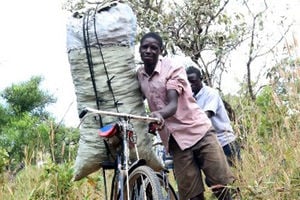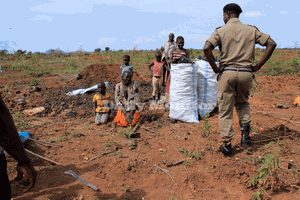
A Uganda People’s Defence Forces soldier at one of the charcoal camps at Apaa Junction in Mungula Parish, Itirikwa Sub-county in Adjumani District on April 18, 2023. PHOTO | TOBBIAS JOLLY OWINY
Ociti, a resident of Oberabic in Amuru Sub-county, Amuru District, loads his motorcycle with three bags of charcoal at Zoka C Trading Centre in Apaa Town Board, Adjumani District.
He and three other riders are taking their illicit merchandise, harvested from Zoka B Village to Apaa junction where a truck is parked away from a security (police) checkpoint.
For each trip of three bags ferried, their master, Sseguya, a commercial charcoal dealer, pays them Shs5,000. Ociti on average makes seven trips a day to earn him Shs35,000.
In an interview, Sseguya says he will not withdraw from the business until he repays a Shs20m bank loan he injected into it.
“I bought the trees five years ago from the landowners and added another set last year, where I am now producing the charcoal,” says Sseguya.
In February 2023, Ssekyanzi, a resident of Nansana Municipality, Wakiso District, who now owns a charcoal burning camp, in Acholibur village, hired 75 acres to carry out commercial maize growing.
We learnt that she has since not planted a single maize seed on the land but only cut all the trees on it and burnt them for charcoal.
“When security cracks down on them, they cross deeper into Itirikwa Sub-county in Adjumani District and continue the vice there,” Mr Wilson Acuma, a resident of Oyanga Village, says.
Commercial charcoal dealers have destroyed the trees in the villages of Coro, Aker, Luro, Apaa (a resettlement camp), Goro B, Kalacut, Acut, Zoka, and Kamdini, among others.
In the villages of Acholibur, Gaji, Oyanga and Rwot-Oromo where tree cover had remained intact until early 2023, the dealers have cleared everything standing.
“I am in Apaa, I came here conditionally, I cannot go back without any money, where would I start from, where will my children get school fees from, or money to feed them?” Ssekyanzi asked.
At Zoka C centre, we found a light blue box-body truck whose registration number had been concealed, said to be the one Ssekyanzi together with two others hired for transit of their charcoal from Apaa to Kampala.
“With charcoal, this is a smuggling business, I can smuggle from anywhere and I pass, I mean, they have banned it but we can pass in the panya route and you go,” she says.
“Suspicious military or police officers we find on our way, we give them ‘something’ and we pass through those bushes,” she adds.
Nambiro’s friends in 2019 convinced her to leave her home district of Luweero to come to Amuru District and do farming since there is plenty of arable land and reliable rains.
She says she took a Shs30m loan from their Sacco to hire the land that would later turn into a charcoal production farm.
Four years down the road, she has built a house in Luweero Town and started setting up another commercial building, which she hopes to complete through the charcoal business.
“Since the presidential directive against charcoal business, I sneak my charcoal through security checkpoints by giving bribes to the police manning the checkpoints, and they allow us to move, they (police and the army) are given money but some do not accept,” she says.
Charcoal trade in Acholi Sub-region has nearly doubled since the issuance of the presidential order, which outlawed it.
Most of the charcoal produced originates from Adjumani District, especially in the Zoka forest corridor and Apaa.
The dealers have switched from transporting the charcoal on open trucks to covered vehicles.
While in Apaa on Saturday last week, the Daily Monitor recorded seven box body trucks whose registration numbers had been concealed, being loaded with illegal charcoal.
Crackdown
The leadership of the UPDF 501st Brigade that oversees West Acholi recently launched a crackdown against illegal charcoal dealers.
More than 50 trucks (trailers) were impounded and the charcoal was auctioned.
For example, four trucks from the Apaa area were impounded last month at the Akurukwe security checkpoint near Gulu City. Each truck contained 1,000 bags of charcoal.
The UPDF say they launched operations to enforce the presidential directive. Lt Col Kenneth Ahimbisibwe, the 501st Brigade commander, acknowledged that implementation of the ban on charcoal trade was being hampered by corruption.
“Threats are coming out from all corners, but the moment you crack down on a criminal, they can throw all sorts of attacks aimed at you. Threats are there, but we don’t mind about them; we are in uniform, and we are armed. Now who can threaten us?” Lt Col Ahimbisibwe said.
Currently, there are more than 25,000 people in the Apaa area alone who are engaged in the charcoal value chain, including felling trees, chopping them and building the kilns, among others, according to Mr Francis Owor, the chairperson of Apaa Peace Committee.
“We tried in vain to stop the dealers from getting into these villages but police and the army led them to these charcoal camps. There is no other thing we do because both the police and army are not doing much to fight the illegality,” he says.
According to Lt Col Ahimbisibwe, several motorcyclists, whose jobs are to ferry charcoal out of the bushes to the trading centres to be loaded onto trucks, are now camped in Apaa.
“Today alone, more than 20,000 bags of charcoal have been ferried and heaped here in Zoka C Centre and they will all go, the charcoal you see here is produced in just days,” he says.
“More than 30,000 are not indigenous people here and those are the ones who are now camped here and clearing all these trees with the help of the indigenous community,” he adds.
In an interview, Brig Felix Busizoori, the UPDF 4th Division commander, explained recently that due to the high number of illegal charcoal dealers in Apaa, criminals, including Allied Democratic Forces (ADF) dissidents, were hiding in the area and that it was being used as a corridor to smuggle firearms.
He said many people who the army arrested for illegally cutting trees for charcoal in the area possessed national IDs of either DRC, Rwanda, or South Sudan.
Mr William Amanzuru, the coordinator of Friends of Zoka, a local community-based organisation advocating for the preservation and restoration of Zoka Central Forest Reserve, says the destruction of tree cover in the area has had severe implications on the climate of the area.
“The weather is so drastic, we now experience prolonged dry spells in these areas where people cannot cultivate and have no alternative, with the crop seasons now reducing to one from the previous two planting seasons. Also, every year we see sub-counties flooding. For example, in the past few months, seven sub-counties flooded and the district did not know what to do,” he says.
Mr Amanzuru accuses security agencies of being involved in the charcoal trade.
“Whereas an impression has been created that commercial charcoal burning is only happening in the Apaa area, the army, police and the NFA officials are busy running logging cartels inside the forest with each faction fighting the other,” he says.
Directive
Currently, the country needs about two million hectares of plantation forests to strike a balance with the rapidly depleting natural forests to meet the growing demand for timber and wood products. However, it only has 120,000 hectares today.
In August, Deputy Speaker of Parliament Thomas Tayebwa directed the Committee on Environment and Natural Resources to visit Zoka
forest reserve following reports of grave encroachment and depletion.
Mr Tayebwa said he watched a television documentary that uncovered illegal lumbering and charcoal-burning activities and called for investigations.
Charcoal production Charcoal production in the area has had devastating ecological and environmental effects characterised by deforestation, which is the clearance of forest or woodland.



